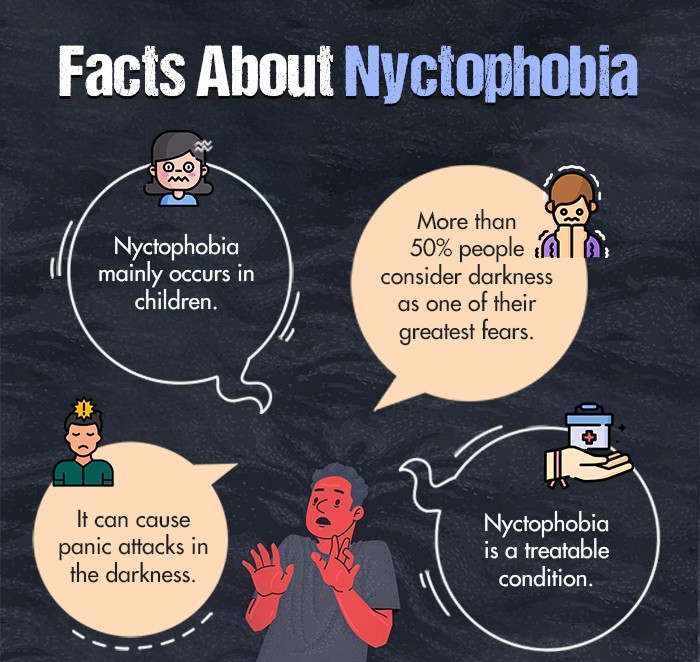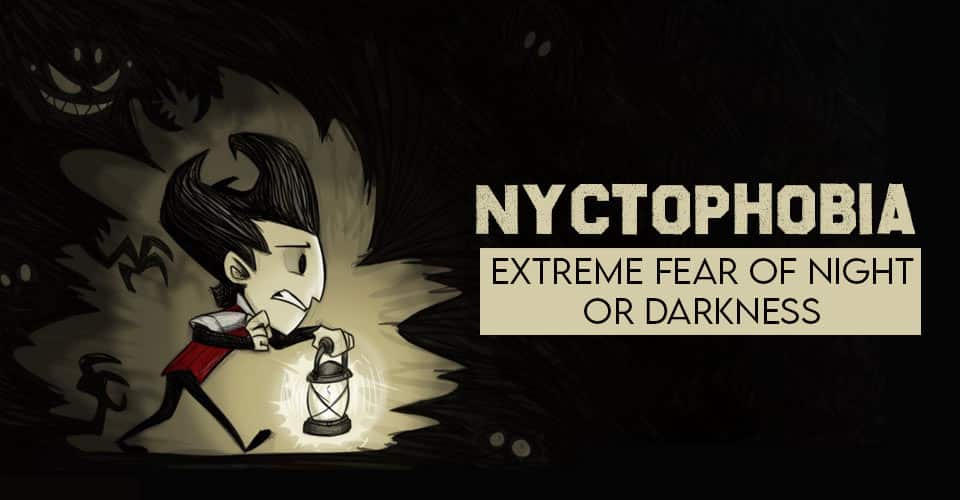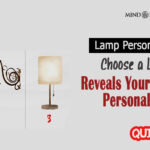Nyctophobia is an excessive and irrational fear of darkness that can significantly impact daily activities, cause avoidance of certain situations, and generate anxiety in anticipation of low light conditions.
What Is Nyctophobia?
Nyctophobia, also known as lygophobia, is a mental health condition defined as an acute fear of darkness and dark places. The term comes from two Greek words- nyktos (night) and phobos (fear).
Although it is usual for children to be afraid of the dark, a strong fear of darkness in adulthood can impair daily functioning and overall well being. Research 1 Levos, J., & Lowery Zacchilli, T. (2015). Nyctophobia: From Imagined to Realistic Fears of the Dark. Psi Chi Journal of Psychological Research, 20(2), 102–110. https://doi.org/10.24839/2164-8204.jn20.2.102 shows that being in a dark environment can cause a “startle” response in humans that releases certain chemicals enhancing our perception of anxiety.
People with nyctophobia experience intense anxiety 2 Cahill, K., Illustrator, A., Leighton, S., & Yeager, A. E. (2002). Harvard Medical School A Special Health Report from Harvard Medical School. http://hrccatalog.hrrh.on.ca/InmagicGenie/DocumentFolder/copinganxietyphobias.pdf at night or in dark places. On a day to day basis, such people may avoid going into dark rooms and may carry a flashlight wherever they go.
Additionally, they may also sleep at night with lights on and get anxious when the day turns to night. Dark places such as the theater or the nightclub can also act as nyctophobia triggers.
In a 2015 study 3 Levos, J., & Lowery Zacchilli, T. (2015). Nyctophobia: From Imagined to Realistic Fears of the Dark. Psi Chi Journal of Psychological Research, 20(2), 102–110. https://doi.org/10.24839/2164-8204.jn20.2.102 conducted among college students, about 54% of participants rated darkness as one of their top 5 fears.
Case Example
When she was 5 years of age, Chavi had a harrowing encounter with a burglar who broke in through the kitchen window. Ever since then, she had not been able to sleep at night without the lights on or another person in the room to keep her company. Any slight sound would jolt her awake her and make it difficult for her to fall asleep again.
As she grew up, Chavi, like most children, was exposed to horror stories that were almost always set in darkness. These added to her previous fear of sleeping alone at night in the dark. Eventually, she grew to fear darkness all the time.
Even at the age of 12, she was afraid to enter dark rooms and go out of the house when it was dark. She would always keep a flashlight with her in anticipation of a power outage or an unexpected attack in the dark.
Chavi’s fear affected her daily life and social functioning. She bailed on sleepovers, as she could not sleep anywhere other than her home. She pulled out of get-togethers whenever her friends proposed to read horror stories in the dark or watch scary movies.
Case Analysis
From the above excerpt, it is apparent that Chavi is suffering from a debilitating and pervasive fear (phobia) of darkness. It is also known as nyctophobia.

Symptoms Of Nyctophobia
Nyctophobia symptoms are quite similar to that of other phobias.
With nyctophobia, symptoms are triggered in the darkness or even speculating about circumstances where you’d find yourself in the dark. Here are some of the most common physiological and psychological symptoms of the condition.
1. Physiological Symptoms
The physiological symptoms associated with nyctophobia include:
- Trouble breathing
- Racing heart
- Dry mouth
- Tightness or pain in the chest
- Feeling of being choked
- Dizziness
- Shivering or trembling
- Hot or cold flashes
- Sweating
2. Psychological Symptoms
The psychological symptoms associated with nyctophobia include:
- Intense fear of darkness
- A sense of extreme discomfort in the in dark places
- An urge to escape the darkness and avoid situations where darkness is likely
- Self detachment or feeling “unreal”
- Sleep disturbances as a result of being afraid of the dark
However, it must be noted that fear of darkness does not always imply that the subject has a phobia. Only if it persists for more than 6 months and interferes with your ability to function in everyday life can it be considered a phobia.
Read More About Phobia Here
What Causes Nyctophobia?
There may be several causes of nyctophobia. Some factors resulting in the development of nyctophobia in individuals, especially in children, have been discussed below.
Traumatic Experiences
One of the most common nyctophobia causes is the experience of traumatic events in the dark, in childhood 4 Carney, C. E., Moss, T. G., Atwood, M. E., Crowe, B. M., & Andrews, A. J. (2013). Are Poor Sleepers Afraid of the Dark? A Preliminary Investigation. Journal of Experimental Psychopathology, 5(1), 2–13. https://doi.org/10.5127/jep.032312 . Such experiences may include abuse, domestic violence or accidents. These may leave a person with bad memories and insights about the danger connected with night and darkness.
Evolutionary Factors
Nyctophobia can also be the result of acquired behavior that has passed on through generations. Fear of the dark has a degree of evolutionary value, as some predators hunt and kill at night. There may also be increased chances of burglary and such things in the night. Thus, humans have learnt to be alert in the dark.
Other Mental Health Conditions
If someone has a history of other mental health conditions, especially post-traumatic stress disorder (PTSD) and other specific phobias, they may be more prone to developing this condition 5 Garcia R. (2017). Neurobiology of fear and specific phobias. Learning & memory (Cold Spring Harbor, N.Y.), 24(9), 462–471. https://doi.org/10.1101/lm.044115.116 . Simple incidents such as the occurrence of a sudden blackout alone can make the person nyctophobic.
Read More About PTSD Here
Other Factors
Darkness also intensifies a person’s other senses 6 Carney, C. E., Moss, T. G., Atwood, M. E., Crowe, B. M., & Andrews, A. J. (2013). Are Poor Sleepers Afraid of the Dark? A Preliminary Investigation. Journal of Experimental Psychopathology, 5(1), 2–13. https://doi.org/10.5127/jep.032312 . When a person is unable to see the source of noise or movement, chances are high that they will experience extreme fear when they hear or sense something.
Sometimes, watching horror movies or hearing about incidents in the media of tragedies that have taken place in the dark may also lead to nyctophobia. Media influence might trigger this phobia in someone who was already prone to it.
Complications Of Nyctophobia
A persistent fear of the dark can make it quite difficult for a person to function in everyday life. Some of the complications may include
- Inability to go out at night
- Inability to watch movies at the theater or go to clubs
- Loss of sleep at night
- Constant fear of the lights going out, etc.
Nyctophobia Diagnosis
Nyctophobia can be diagnosed as a specific phobia as per the Diagnostic and Statistical Manual of Mental Disorders (DSM-5 7 Specific Phobias (Symptoms) | Center for the Treatment and Study of Anxiety | Perelman School of Medicine at the University of Pennsylvania. (2013). Upenn.edu. Available from : https://www.med.upenn.edu/ctsa/phobias_symptoms.html ). A diagnosis is usually carried out by a mental health professional (such as a psychologist or a psychiatrist) after a careful evaluation of the symptoms and the history of the patient.
There are no specific tests for diagnosing nyctophobia, thus it is mainly assessed on clinical judgment.
Treatment For Nyctophobia
A combination of diverse therapies and medication can help to control nyctophobia.
Therapy
The different types of therapies to treat nyctophobia have been elaborated further.
A. Exposure Therapy
Exposure therapy 8 Ph.D, I. M., & Ph.D, R. E. M. (2015). Phobias: The Psychology of Irrational Fear: The Psychology of Irrational Fear. In Google Books. ABC-CLIO. https://books.google.co.in/books?hl=en&lr=&id=1BfYBgAAQBAJ&oi=fnd&pg=PA240&dq=studies+on+exposure+therapy+for+treating+nyctophobia&ots=QCp-ShFR6y&sig=bxAIN00cF_d_spNcy20LOGL07GA#v=onepage&q=studies%20on%20exposure%20therapy%20for%20treating%20nyctophobia&f=false is considered as one of the most effective therapies to treat specific phobias, including nyctophobia. It involves a gradual exposure to the feared stimulus, which in this case is darkness.
At the initial stages of the therapy, a person is exposed to a dark room during the daytime and then slowly to a dark room during the night time. The therapy can also include the presence of other people in the initial stages.
A new type of therapy known as the ‘Night Forest Virtual Reality’ has recently been proposed as an innovative treatment for nyctophobia, which involves a virtual reality application that simulates a forest.
B. Cognitive Behavioral Therapy (CBT)
The goal of nyctophobia treatment in CBT is to question the terrifying beliefs associated with the dark, thereby replacing negative self-talk with more positive messages. CBT helps a person to step back and analyze their thoughts, emotions, and feelings more deeply.
Read More About CBT Here
C. Mindfulness-Based Stress Reduction (MBSR)
MBSR is an 8-week evidence-based treatment that offers profound mindfulness training to help people suffering from anxiety, stress, depression, and phobias. MBSR can be a very effective treatment for people 9 Annals of Tropical Medicine and Public Health (ATMPH): Free full text articles from Ann Trop Med Public Health. (n.d.). Annals of Tropical Medicine and Public Health (ATMPH). Retrieved March 1, 2023, from https://www.atmph.org/#:~:text=The%20previous%20studies%20have%20shown suffering from nyctophobia.
D. Hypnotherapy
Hypnotherapy 10 Hypnosis in the Treatment of Anxieties, Fears and Phobias. (n.d.). Www.wellness-Institute.org. Retrieved March 1, 2023, from https://www.wellness-institute.org/blog/hypnosis-in-the-treatment-of-anxieties-fears-and-phobias can be beneficial if trauma from the past is involved. A trained and certified hypnotherapist can induce a state of deep relaxation to find the reason behind your phobia. The right suggestion from the therapist may also help relieve your symptoms.
E. Psychoanalysis
Psychoanalysis may help you remember or identify the various incidents in your past that may be the key reason for your phobia for the dark. The more you learn about your thoughts and reaction patterns, the better position you happen to be in to make changes.
How To Get Rid Of Nyctophobia?
You may be able to cope with the fear of darkness using some home remedies along with professional treatment.
Some self-help strategies for dealing with nyctophobia have been mentioned below.
- Come up with an affirming phrase such as “It is dark, but I am safe,” to repeat when you are feeling anxious due to darkness.
- Practice deep breathing workouts or yoga to slow down your thoughts and promote sound sleep. According to a study, a wide range of yoga practices may be helpful for anxiety disorders including phobias as it decreases physiological arousal – for example, reducing the heart rate, lowering blood pressure, and easing respiration.
- Think of a positive image in the dark, like imagining your pet or a place that binds good memories. Such positive images can help you to overcome negative thoughts and cope with the dark better.
- Practice techniques such as progressive muscle relaxation that can help you relax each part of your body and reduce feelings of tension.
- Try to have someone accompany you when you have to go out in the dark.
Takeaway
Nyctophobia can result in adverse effects if it is not treated right and in time. Hence, make sure to consult a doctor once the symptoms start showing up. Remember that the fear of darkness has nothing to do with your bravery or independence as an adult.
The condition can develop in anyone, irrespective of time, age and environment. However, professional help and adopting coping strategies can help you function better and more effectively.
At A Glance
- Nyctophobia, also known as lygophobia, is a mental condition defined as an acute fear of darkness and dark places.
- While there are individuals who may still be scared of the dark, in some people this fear may have developed into a phobia.
- Patients with this condition undergo intense anxiety at night or in dark places.
- The goal of treatment is to question the terrifying beliefs associated with the dark, thereby replacing negative self-talk with more positive messages.
- Nyctophobia can result in adverse effects if it is not treated right and in time.
- The condition can develop in anyone, irrespective of time, age and environment.
Frequently Asked Questions (FAQs)
1. How common is nyctophobia?
Studies show that nyctophobia is one of the most common phobias, especially among children and even among adults.
2. Who discovered nyctophobia?
Specific phobias were first categorized as a mental disorder by the American Psychological Association in 1952 and the various kinds of phobias were classified soon after. However, the fear of darkness has been around for longer than that although it was previously not formally recognized.
3. Can Nyctophobia be cured?
With adequate therapy and self-help, it is possible to overcome nyctophobia and live a regular life.
4. Who is at risk of nyctophobia?
People who are predisposed to or suffering from anxiety disorders and who have been through traumatic events in the dark may be more prone to nyctophobia.














